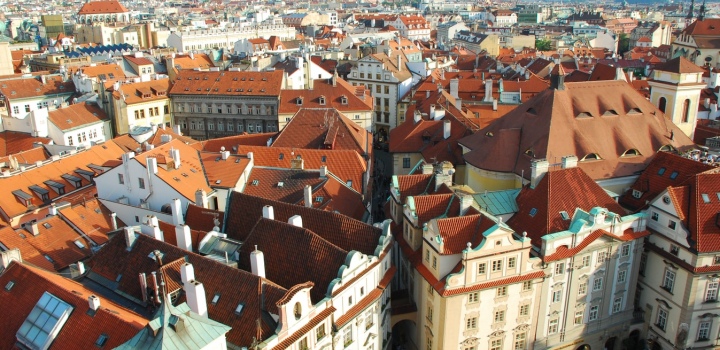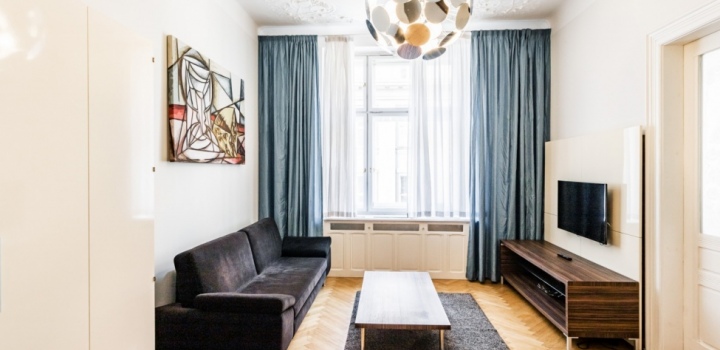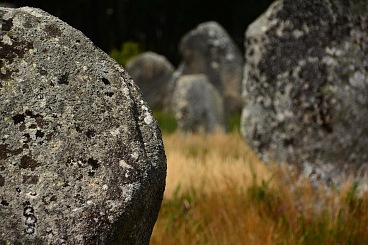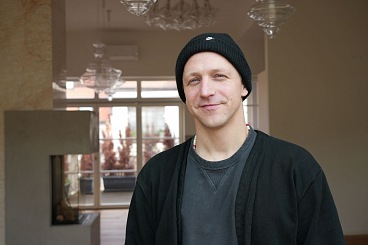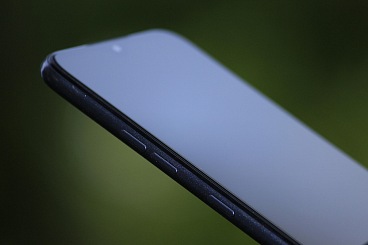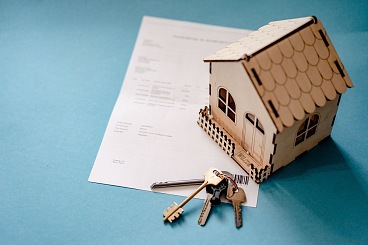Fast confession – MEP Markéta Gregorová: I’m kind of obsessed with youtubers
With few people can appearances be as deceiving as it with the Member of the European Parliament Markéta Gregorová. She is very young, purple-haired, greets you with a leather-gloved handshake and there’s a peculiar video circulating around the web, where she plays the ukulele and sings about drugs. But once you actually start to chat, you can’t help but feel every politician should be like her. Markéta keeps a clear set of values, avoids useless political platitudes and has studied every topic she talks about into the tiniest detail. With LP-life.com she talked about music, fake news or why her pet cat’s name is Cat.
So, do you still play in a band?
Of course, I have been in my band "Definitivní Ententýk" since I was 18 years old, so this year it’s gonna be whole 10 years. Currently, during the pandemic, we don't have any gigs to play, but – if the measures allow it – we still meet for rehearsals and plan to record a few singles as well.
What’s the difference between politician Markéta and musician Markéta?
Music is much more important to me. It’s been with me for so long, it’s much more than a hobby, it’s very close to my heart. Politics, on the other hand, is my job, a public service that I’m not planning to do for my whole life. Right now I have enough energy for it and want to be involved in it, but music is something I’m doing solely for myself.
Can politics and music inspire each other?
I’m not sure if I’d call it inspiration. But it’s been definitely an advantage that I’m used to performing, singing and speaking into the microphone in front of an audience from a young age. It really pays off when it comes to giving various speeches or participating in meetings.
You don’t get stage fright anymore, then?
I never have. I can get nervous whether I have enough information, or that I might forget my lyrics when I’m on stage. However, there’s always a way to ride it out, and nothing is eaten as hot as it is cooked, right?
Which instruments do you play?
I can’t really play any... As a child, I used to play the piano for 8 years, but I don’t remember almost anything of it. Later I tried to teach myself to play the guitar, I can get a few tunes out of it, but all I ever do is strum by the campfire, playing background for others who can actually play.
Of course, everyone knows my pink ukulele, but I would never say I can play it. A year ago I promised to record a song as a reward for my HitHit backers, supporting my European Parliament election campaign. Recently I've recorded another and I had to edit all of it, since I wasn’t even able to play three chords in a row (laughter).
In this context, I can’t forget to ask about your rather notorious song that can be found on YouTube when searching your name. You sang about drugs very openly there. In hindsight, how do you feel about it?
I see a paradigm shift in the society I live in. When I recorded this song five years ago, it was just a joke. Even though I’m singing about so-called „drugs“ there, as it’s a shorter, simpler term, the clip doesn’t actually show anything illegal – only alcohol, nicotine and caffeine. Even the cigarette that people believe to be cannabis is actually just tobacco.
It’s interesting how the term „drugs“ makes people nervous, even though one of the hardest drugs is alcohol, which is legal. If I were singing about hangovers, no one would bat an eyelash, but singing about crashes in general, which could potentially include illegal drugs, everyone loses their mind and starts acting like it’s not a joke. Our society’s perception of this topic is really interesting, and that song is a part of raising awareness. Maybe a controversial one, but one nevertheless.
Do you still, after all those years, get heated reactions?
Of course! Anything I write online, be it about Russia, Navalnyi or disinformation, I’m sure to find someone in the comments section calling me a junkie, or commenting "LOL, it’s the ukulele chick."
I just don’t get why it stuck with people so hard. On the other hand, from my work I happen to know how many of these accounts are fake, just trying to drive the conversation away from the topic I’m addressing. I don’t have any hard feelings about it, that’s just how social media are. However, it motivates me to push my educational activities even harder than the trolls push their narratives.
You are very active on social media. Do you think they can act as a drug of a kind as well?
Yes, to some extent, in the sense that they can be addictive. Social networks are engineered to create addiction; the „like“ button is no coincidence. It’s completely on purpose, as „Liking“ something you really enjoy gives your brain a dose of dopamine. And you will become addicted to it.
How these networks work has already been described quite well. Some people are all about Facebook, some about TikTok or whatever. Social media affect our lives a lot, and it's time people started to realize that. They don’t even have to limit their social media presence, they just need to understand they’re being deliberately manipulated to increase their content consumption. We need to remember we’re not the target groups of social media. We’re not the customers; we’re the products. Their customers are the companies advertising on them.
Recently you posted a video featuring fake Andrej Babiš saying made-up stuff. What did you want to demonstrate with it?
This video is a part of a several months long campaign „Truth hurts“, focused on raising awareness about the topic of disinformation. It was the campaign’s finale, addressing the state-of-art technologies and what they may lead up to. For now, it’s intentionally imperfect, to make it clear I’m not actually trying to manipulate anyone or make people believe it’s really Babiš. The aim is to raise awareness that such technologies exist.
A lot of people already believe that if it’s written down, it must be true. For instance, one of my friend’s parents told me that "no one would dare to write lies on the internet, would they?" and that’s a view shared by many. And if all of a sudden you show them a video, where someone they know says something that’s been manipulated, how do we prevent them from falling for it?
My bet would be on awareness, media literacy and the knowledge that this simply does happen on the internet. Any online space regulations should only be secondary and implemented with great caution. Awareness is the key.
Will there be a time when fake videos will be so visually perfect that we won’t be able to distinguish them from real ones?
Many people can’t tell them apart already! However, that time is coming, as technologies move forward. I’d go as far as saying that some of the higher-end, more expensive productions can already make such videos. And high-budget movies already feature incredible CGI (Editor’s note: Computer-Generated Imagery) elements.
As for the widely available technologies, there already are apps able to transfer your face, even from a photo with a limited number of data points, to, say, an erotic video pretty convincingly. With such high-quality apps already available, I’m afraid that even more advanced forms of disinformation are right around the corner.
When you were elected to the European Parliament in 2019, how did they perceive you, waltzing in there as a young girl with purple hair?
I didn’t notice any strong resentment or anything like that. If you come to a meeting being the, as I like to say, most informed person in the room, people listen to you. I can’t compare with the atmosphere in the Czech parliament, but one thing I really appreciate in the globalized, multicultural environment is that there’s no place for prejudice.
Of course there are some big nationalists in there as well, but even they have to consult colleagues with different skin colour at times. They have to get along, even if at home they sound the alarm against those kinds of people. And it’s the same with everything else there. During the hearings, we strictly talk arguments, facts and what needs to happen.
Does this also apply to you as a young woman? After all, there’s a pretty big proportion of elderly gentlemen who might be suspicious or sexist towards you.
I haven’t seen any sexism in the Parliament, though there’s been some slight ageism (Editor’s note: age discrimination). It’s been that paternalist attitude of certain older gentlemen who feel they always know best. However, if you bring arguments to the table, even they have to work with those arguments and not their own prejudice. I even have a good experience that people, who’ve been there for longer, are always willing to help and give advice.
If you were to debunk one thing about Brussels for Czechs to be aware of and remember, what would it be?
That things are being decided in Brussels or that Brussels is Germany, because it's the biggest country deciding everything. I will not go into the whole legislative process, but there are three decision-making institutions in the European Union. Each state nominates its people to the European Commission, which is the main one, all citizens elect to the European Parliament and all states have their own ministers and prime ministers in the Council. We all have to agree there, and what is agreed on goes then to the Member State, where the directive or regulation is up to the government and the House to implement.
There is no room for one Germany or one Brussels, the Member States always contribute significantly. They have not given up many of their competences, and if any politicians say so, they are lying. The European Union is still a great democracy. Yes, it is complicated, so it is sometimes difficult to explain the whole process, but it is worth it.
On the other hand, is there anything you became disillusioned with?
Probably mostly with despite all this being the great power triangle, some individuals still think they’re the most important in the world and that without them, the whole European Union would come crashing down. We are all parts of a giant puzzle, and obviously, without any puzzle piece, the whole picture would not be perfect. On the other hand, no single puzzle piece makes the whole picture, not by a long shot.
I've read somewhere that you perceive food only as "fuel" and that you are pretty indifferent about it.
That's right, I have a neutral relationship to food. I used to be a bigger gourmet, but then I realized that I wanted to get more work done and stay alert all the time. And the food takes long to prepare, and then all the fussing about how it tastes… That just doesn't agree with me. Gradually it faded away, and I don't have any significant taste requirements anymore.
So you avoid food debates, then?
I have knowledge from the past, I can contribute to the debate and I can even cook pretty well. However, I do not engage proactively in such debates (laughs).
I also get that you have a pet cat named Cat...
When I was a little kid, our school would use some more creative learning methods in our English lessons sometimes. One day we were told to match various names with colours and then work with that further. I happened to finish too fast, I had already matched all the names – mine, my parents‘, my brother’s – and so the teacher says "Let’s do the name of your favourite stuffed animal. Which one is it?" At that time I had this hand puppet of a horse, so I said "Horsie." And the teacher says: "And what’s his name?" and I’m like "Horsie."
Sometimes I think that if the teacher knew I have a cat named Cat today, he wouldn’t think I've progressed much in my creativity (laughs). But I just like to call things as they are.
Is that some kind of rebellion?
It’s practical. Plus, if you call them as you see them, you can be sure no one’s going to call you out. Likewise, if I consider something to be stupid, I usually can’t hold back and blurt it out. I don’t really treat people with kid gloves, not even my friends. And you might be surprised how often you disrupt other peoples' beliefs and prejudices, if you really call things as they are.
Can there be truth in politics at all?
Of course, there are some data and facts that remain immutable, unless someone refutes them with other data. But then we have ideologies and values, constantly trying to discuss and compromise over them. Therefore, if, for example, most people in a society share the value that murder is wrong, we adopt laws that prohibit and penalize murder. And if society ever shifts and stops perceiving murder as wrong, those laws will be repealed. Politics is a continuous debate and a compromise.
Which values are most important to you?
Definitely truth, I can’t deal with lies and various injustices at all. Then there’s openness „slash“ tolerance. I need to surround myself with people who won’t condemn me at the first sight. And if they disagree with something, they consider arguments they were told and offer rebuttal arguments, not personal attacks.
What do you like to do in your spare time?
If I want to relax for a while, I hit YouTube – I’m kind of obsessed with YouTubers. Although most often I watch PewDiePie, which is the currently most-viewed creator, I subscribed to many others, mainly foreign creators, and regularly watch their content, mostly about games or comedy. Sometimes I even play a game myself – spend a few minutes in Minecraft building something, etc.
When I have more time, a day off, I read quite a lot. I wrap myself in a blanket and relax with a book. And if the pandemic measures allow it, I meet my band and we rehearse or play gigs. I try to meet as many people as possible, I like to go grab a beer or coffee, all of which is not possible now. It bothers me a lot, because I am a social person.
This unpleasant time must put you in a bad mood often, then.
The first six months were very challenging and I often felt depressed or sad. I had to deal with the fact that in this changed world I can’t "draw my fuel." I might have delved into my work even a bit more than before, even though that’s not exactly healthy, but for me, it was kind of a substitute for everything else.
Now I’m trying to get used to the fact that even a video call is nice. And whenever the pandemic precautions allow it, I hang out with someone. We keep our distance, we have to shout at each other a bit, but it’s better than nothing.
What makes you laugh the most?
Sarcasm, that’s my kind of humour. Irony and trolling, poking a little fun at someone. But only when I know they can handle it, I’m not a mean person (laughs).
How do you make fun of people?
Usually, it involves people I know and feel that they can take this kind of humour. People you know are the best to roast, since you already know where to poke to make it zing. Therefore, I don’t really have an example to tell, it’s more of a situation comedy with me. Something happens and I react.
Thank you for the interview.
Fast confession:
What helps you when you’re sad?
What are you most afraid of?
How would you characterize the European Union in three words?
Do you have any vice?
What’s worse, political disloyalty or being cheated on?
Your lifelong motto?
What was your worst grade at school and what was it for?
What do you like to splurge for?
What really grinds your gears?
What book did you read last?
First vacation you want to go on, when the situation allows?
What do you do for the environment?
Your greatest blunder in politics?
Do you enjoy your work?
Thank you.









